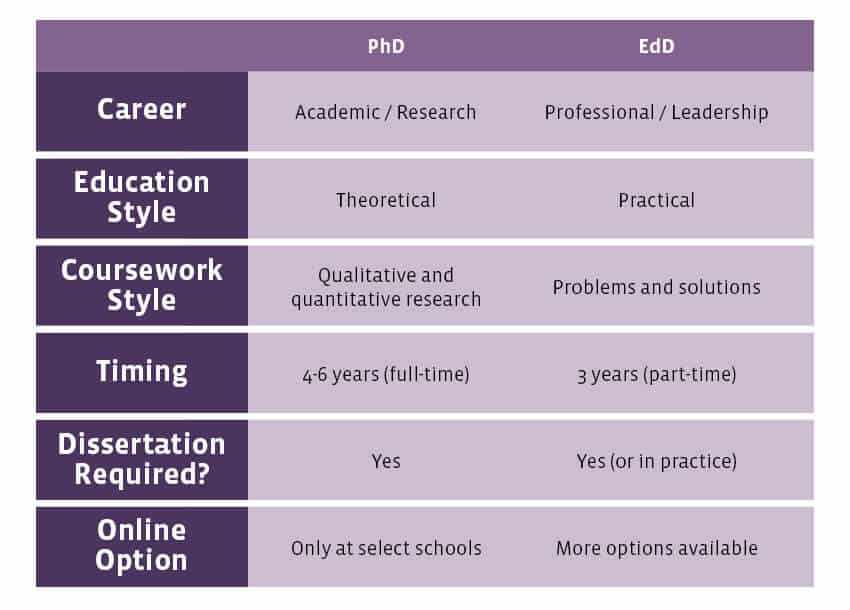EdD Vs. PhD: Key Differences And Tips For Choosing
Updated: June 19, 2024

When it comes to education, there is a broad array of jobs within the field. Depending on what kind of position and career you wish to have, you can choose to earn either an EdD or PhD. Regardless of which you choose to earn, you’ll first need to have your master’s in education. Then, you can decide which degree to pursue between an EdD vs. PhD by understanding their differences and choosing the path that will best help you to achieve your career goals.
What Is An EdD?
An EdD stands for a Doctor of Education. It’s a professional degree that is intended for those who want to work in educational leadership or business. The degree is practice-based and prepares graduates to be able to influence both communities and educational systems. Candidates can work in K-12 education, higher education, nonprofits, the military, government, and healthcare.
What Is A PhD?
A PhD in Education stands for Doctor of Philosophy in Education. For those earning their PhD in Education, it’s a terminal degree — which means it’s the ultimate degree level one can earn. PhD programs are more theoretical in nature and study-based compared to the practical design of an EdD. It’s the better choice for students who want to become a professor, land a tenure position, or work in academic research. Students often are published in journals, present at conferences and learn how to teach other educators during their PhD.
What Can You Do With An EdD?
Graduates with an EdD can work in a variety of positions. Common jobs for those with an EdD include:
1. Elementary and Secondary School Administrators
In elementary, middle, and high schools, school administrators manage academic programs, staffing, and budgets within their district.
2. Postsecondary School Administrators
Administrators work in colleges and universities to help oversee faculty, admissions, student affairs, and academics.
3. Executives
Those with an EdD can serve in executive positions such as chief learning officers or chief academic officers. These C-suite executives create strategies to help the company achieve business goals.
4. Coordinators
Instructional coordinators design curricula and educational materials. They may work with teachers to help provide learning strategies and maximize learning for students.

Photo by Pixabay from Pexels
What Can You Do With A PhD?
A PhD is a more theoretical program. It is designed to train graduates to be able to take up teaching positions at the college level or to perform research. Those with a PhD may become:
1. Professor
Professors teach at a college or university level. They are often focused on research and publish their work in journals or books.
2. Academic Researcher
Researchers can work in their own research center and often have the opportunity to obtain funding for their work. They may perform research on behalf of a government, public, or private institution.
EdD Vs. PhD In Education
It’s already obvious as to how these two programs are dramatically different. Let’s dive into more details regarding how they compare to one another.
Main Differences Between EdD Vs. PhD
Education Requirements
It goes without saying that the educational requirements for the two degrees are quite different. Let’s take a look at what they are:
- An EdD requires a master’s degree first. The program may take 1.5 to 3 years on average to complete. Oftentimes, students continue to work while earning the degree.
- A PhD is also attained after a master’s degree. Coursework includes: teaching methods, research methods, and a dissertation to graduate. PhDs can take anywhere from 4 to 6 years to complete. Most of the time, students are enrolled in the program full-time as it’s a demanding schedule.
Specialty Tracks Of EdD And PhD
Along with the popular career tracks for those who earn an EdD and PhD, there are more speciality tracks a prospective student can choose from.
PhD programs offer specializations in:
- Adult education
- Leadership
- Special education
- Early childhood education
- Instruction and learning
On the other hand, EdD programs have specializations in:
- Administrative leadership
- Higher education
- Literacy leadership
- College teaching and learning
Who Should Get A PhD Vs. EdD?
There’s really no single right or wrong answer as to who should get a PhD versus an EdD. Ultimately, the best way to decide is based on your career goals.
If you want to be a professor or perform academic research, then a PhD is the better path to take. If you’d rather work in administration or policy, then a practical degree like an EdD is the right choice to make!
EdD Vs PhD: How To Choose
Ultimately, when you’re deciding which degree to pursue, you’ll want to take the following into consideration:
- Understand which career path you prefer
- Focus and follow your passion
- Imagine your day-to-day with both degrees in one of the aforementioned positions
- Research programs that offer each degree
- Compare the coursework of each program
- Take a look at specialization tracks
- Estimate your time commitment and program costs
- Trust your gut!
Just Getting Started?
If you have yet to earn your master’s degree, that will be the first step you’ll have to take in any case. You can even choose to earn your master’s degree in education online. The University of the People offers an entirely online program that is tuition-free for those seeking to earn their master’s in education at an affordable, accessible, and quality institution.
One of the best parts about the program at UoPeople is that not only is it accredited, but it also reflects the teaching standards of the International Baccalaureate (IB). Students can complete the program by taking a minimum of 13 courses for 39 credits.

Photo by Benjamin Child on Unsplash
The Choice Is Yours To Make!
Whether you decide to earn your EdD or PhD, you’ll be making a major life decision. Both degree paths lead to different positions in education. Remember, EdDs are more practical in nature and lead to jobs in administration or executive-level opportunities in business. PhDs are geared towards those seeking a career in academia and research.
Once you understand your career goals, choosing between an EdD vs. PhD becomes a much clearer and easier choice to make!



